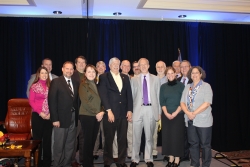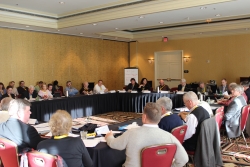The Office of Environmental Management supports, by means of grants and cooperative agreements, a number of institutionalized activities and relationships with various national intergovernmental organizations. These organizations include the Energy Communities Alliance, the Environmental Council of States, the National Association of Attorneys General, the National Governors Association, and the National Conference of State Legislatures, and the State and Tribal Governments Working Group. The Department’s relationships with these intergovernmental groups take many forms, but the common thread of purpose that runs through all the activities is the need for EM to enjoy open, amicable, and trusting relationships with its governmental colleagues at the state, local, and tribal level in order to better carry out its mission.
Since 2003, all of the intergovernmental groups have met together once per year in a single forum to enhance collaboration and cooperation. This combined Intergovernmental Meeting allows senior EM officials to meet and discuss important issues with all the affected state, local, and Tribal government officials (both elected and appointed). Additionally, in order to follow-up from action items developed at the meeting, the groups convened a Combined Intergovernmental Working Group (CIWG). The CIWG consists of two members of each of the intergovernmental groups along with representatives from the Department. The CIWG hosts regular calls to circulate new ideas and information among the groups, as well as to plan the combined Intergovernmental Meetings.
For more information on each intergovernmental groups’ activities, please visit their individual websites:
Energy Communities Alliance (ECA) - ECA is the organization of elected officials and administrators from local governments that are adjacent to or impacted by Department of Energy (DOE) activities. ECA's mission is to bring together local government officials to share information, establish policy positions, and advocate community interests in order to effectively address an increasingly complex set of environmental, regulatory, and economic development needs.
Environmental Council of the States (ECOS) - ECOS is the national non-profit, non-partisan association of state and territorial environmental agency leaders. The ECOS Federal Facilities Forum affords state and federal environmental management officials the opportunity to interact, share information, learn from each others' expertise, and work together to negotiate various technical and political issues related to the cleanup of various polluted federal sites. The ECOS Federal Facilities Forum (FFF) provides a forum for dialogue between ECOS members and officials from various federal agencies tasked with environmental management duties at various federal facilities.
National Association of Attorneys General (NAAG) - NAAG and DOE have established a working group of Assistant Attorneys General and key DOE staff to discuss current regulatory and statutory enforcement/compliance issues. As the parties work towards their common goals of ensuring the protection of human health and the environment through the clean-up and the proper management of DOE activities, the continuation of this productive workgroup is of importance to state Attorneys General and has also been found to be mutually beneficial to the state and to DOE.
National Governors Association's (NGA's) Federal Facilities Task Force - The NGA’s Federal Facilities Task Force consists of representatives from Governors' offices from states which host DOE facilities. The purpose of the Task Force is to assist DOE in improving coordination of its major program decisions with Governors' offices and state regulators and to ensure such decisions reflect input from these key state regulators.
National Conference of State Legislatures (NCSL) - DOE funds a cooperative agreement with NCSL that provides both logistical and staff support for the State and Tribal Government Working Group (STGWG) as well as meeting with elected legislatures from states with particular interests in EM activities. With the support of this agreement, the NCSL serves as a conduit for informational exchange regarding the cleanup of the nuclear weapons complex between the Department, state legislatures, legislative staff, state executive branch staff, and tribal government representatives.
The State and Tribal Government Working Group (STGWG) – STGWG helps ensure that DOE facilities and sites are operated and cleaned up in compliance with all applicable federal and state laws and regulations, and Tribal rights including those retained by treaty, and conferred by statute and the trust responsibility; as well as in a manner that protects human health, safety and the environment.












